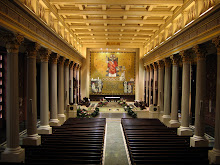An address I gave to the Cincinnati Serra Club:
Yesterday was the 5th anniversary of Pope Benedict’s somewhat infamous ‘Regensburg Address.’ Shortly after he was elected Pontiff, he returned to the school where he first began his academic career to give a lecture to representatives of the Science Colleges on the nature of the interplay between faith and reason, launching from there into a discourse into our understanding of the very nature of God.
It is this aspect that I would like to focus on today, because I think it hits to the core of who we are as Catholics, how we pray, how we worship, how we interact with both one another and with the world, especially as we stand in the shadow of the remembrances of September 11, 2001 and the atrocities committed that day.
Early in his address, Pope Benedict cites a medieval dialogue between the Byzantine Emperor Manuel II Paleologus and educated Persian on the subject of Christianity and Islam, a dialogue which was likely written by the Christian Emperor shortly after this encounter. On a side note, it was the citation of this work that caused a bit of backlash in the Islamic world, but which has ultimately led to a greater and deeper dialogue between the two great cultures, which may be one of Pope Benedict’s lasting legacies, one which is only seen in hindsight.
As Pope Benedict launches from this discourse into the core of his lecture, he ponders the historical growth of Christianity and the intertwining of Christian thought with Hellenistic, Greek thought. For Pope Benedict, it was a marriage made in heaven, as the Revealed Word of God found new expression in the on-going logical reflection upon the mysteries of this world. In summary, the logical approach of the ancient Greek philosophers found their completion in the Revelation of Jesus Christ, the eternal Word of the Father, the Divine LOGOS, as revealed in both the initial versus of the Book of Genesis and the prologue of the Gospel according to St. John. For the Christian, God is knowable, because God acts in a logical, consistent way, unfolding His divine plan of salvation in way that draws the believe deeper into relationship with the One True God, while still in the context of the corporate Body of the Church.
However, the approach taken towards God in both Islam and, frightenly, in some Protestant circles, is much different. Instead of highlighting the nature of God as LOGOS, rationality and logic; the focus is on God’s omnipotence, His power, His Will: Voluntas. This changes the nature of discipleship in a dramatic way. No longer is one to be drawn deeper and deeper into an ever unfolding manifestation of the mystery of God; now all one has to do is follow, obey.
The result of this shift in focus from the rationality to the power of God results, actually, in a split between faith and reason. No longer should reason be used to explore the mysteries of the faith, for to do so is to cheapen the faith into something man-made, or so it is thought. As a result, theology dies a slow and painful death, while the sciences take precedence and priority.
Pope Benedict, however, does not conclude with a call to return to an age prior to the Enlightenment. Rather, we must seek out a new wedding of faith and reason, one that sees these two great approaches to modern understanding wedded back together. For the believer, faith must necessarily take a leading role in guiding reason to the one foundation of Truth: Jesus Christ.
We must also examine our prayer life, seeking out a deeper understanding of to whom it is that we pray. Do we pray to have our will taken away? Or do we pray to come to a deeper understanding of the mysteries of God so that we can then operate in this world as a more committed disciple of the Logos? It is this latter approach that we see the tide of a secular culture turned back and continued new flowering of Faith as the New Evangelization dawns as we still sit at the precipice of the Third Christian Millennium.
Tuesday, September 13, 2011
Subscribe to:
Post Comments (Atom)






No comments:
Post a Comment